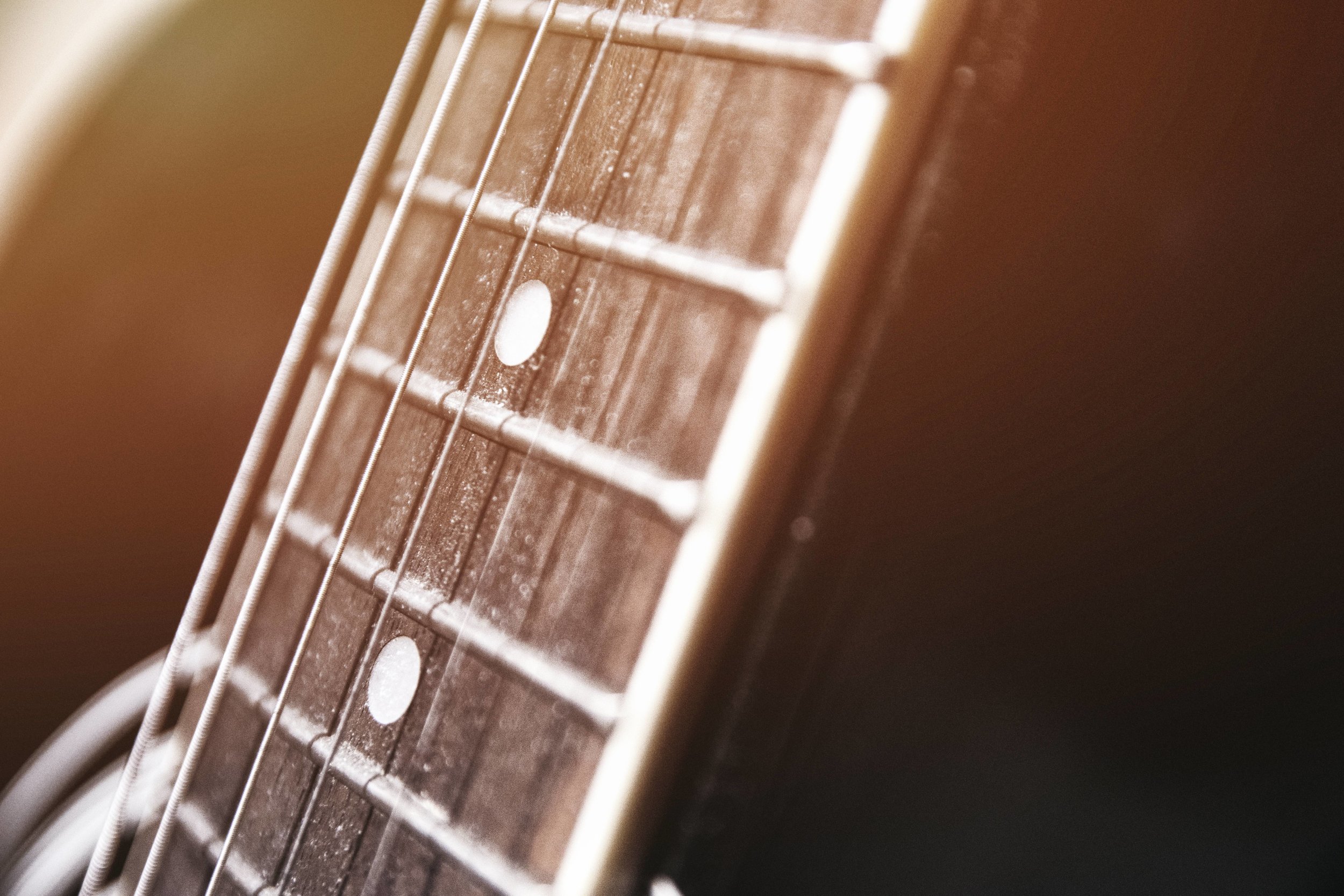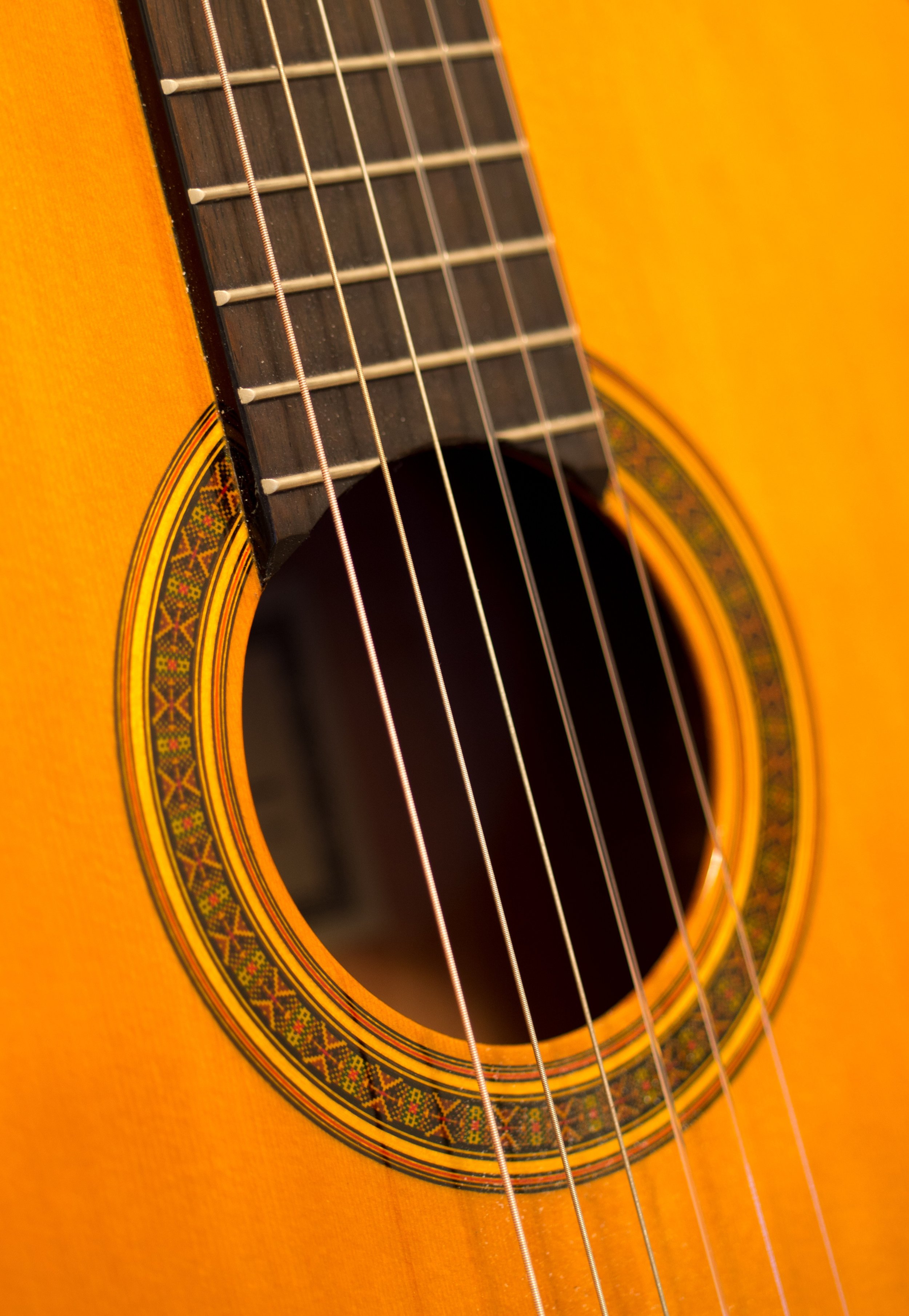Guitar strings are available in a wide variety, and knowing which type to buy can be confusing. Once one starts considering gauge size, material of the string, coatings, and different brands, it can be easy to feel overwhelmed!
The best way to buy strings is to educate yourself on some of the generic terms and figure out what type of music you mainly like to play on a specific guitar. Since using the wrong strings on your guitar may damage your instrument, knowing these things will give you a better idea of what type(s) you should purchase.
Steel string, or "acoustic" style guitars require different strings than nylon or "classical" style guitars. This article will cover the basics of nylon and steel strings; we’ll save electric guitar strings for a separate article.
Let's start off with the basics of acoustic strings.
String Sizes
String sizes are numbered in 1/1000th of an inch. Different string manufactures vary slightly in their exact numbers within each category, but this table is generally consistent with most companies. It's common to refer to an entire pack of strings based off of the size of the first string. For example, if you want to buy a new pack of acoustic strings, you could go to the guitar shop and ask to buy a pack of "10's" and the worker would grab the extra light package of the brand of your choice.
Heavier strings are louder and richer in tone. However, heavier strings are more difficult to bend and can be tougher on the fingers. This may increase frustration for beginning players. Heavier strings are better suited for jazz players (due to less bending of the strings), strum style guitarists with minimal melodic playing, and slide guitar players (due to the higher action required for slide playing).
● Lighter gauge strings don't produce as much volume and the tone is considerably jeopardized. However, they are easier for beginners to play and to bend. Lighter gauge strings are usually used for blues, rock, or improvisation based players that bend their strings a lot, as well as vintage guitars (because they put less stress on the neck.)
● Different types of guitar bodies may require certain weights of strings. Bigger or jumbo sized bodies are usually better suited for medium or heavy strings while smaller parlor sized guitars tend to perform best with light to medium-light gauge strings.
● If you play finger-style guitar, you may prefer light or medium-light gauge strings, as it may be easier for your right hand fingers to pick the strings. If you are usually strumming your guitar, you may be best suited for medium to heavy gauge strings. If you do both, you might want to find a set that's the right balance between light and heavy.
● The heavier the gauge of string, the more tension it will produce from the guitar headstock to the bridge. Neglecting to properly set up your guitar when replacing strings to a heavier set could damage the guitar. Talk to a luthier before making dramatic string size changes to your instrument.
Acoustic (Steel) vs. Classical (Nylon) Guitar Strings
Acoustic or steel string guitar strings - Clear, bright tones compared to nylon or classical style strings. You can find "warmer" sounding steel strings, but they’ll usually be tougher on your fingertips and require more pressure to get your notes to sound clearly when playing. With consistent practice, guitarists will form calluses on their fingertips over time which will make playing steel-string guitar easier and more enjoyable. Steel strings on acoustic guitar are generally used for rock, blues, country, bluegrass and singer/songwriter genres. Steel string guitars have a small ball bearing at the end of the string that's used to keep the string in place at the bridge of the guitar after it's wound around the tuning peg at the head of the guitar.
Classical or Nylon Strings - Warmer, gentler and softer sound compared to steel strings. Beginners may opt to begin learning guitar on a classical/nylon string guitar, as they're generally easier to play on. Due to the warmth of the nylon strings, these types of guitars are typically paired well with classical, bossa nova or flamenco guitar styles. Nylon strings are not meant for string bending because nylon doesn't bend as easily steel does. Unlike steel string guitars, nylon strings are to be tied in a special knot at the bridge of the guitar.
Material of Steel Guitar Strings
Bronze - Bright tone. Players that want a true "brass" sound should try a bronze string. If your guitar body style is naturally warm, like a Martin, you may want to try bronze strings to balance your sound, unless you love the lower, warm sound. Bronze strings tend to wear out quicker due to the material's tendency to oxidize faster than other string types.
Phosphor Bronze - Warmer and richer than bronze strings. The Phosphor added to the string helps prolong string life.
Aluminum Bronze - Greater clarity and projection than phosphor bronze. Balanced and focused tone with good string life.
Silk & Steel - Softer and mellower than steel strings. This type of string is best for finger-style guitarists, as they tend to prefer the softer material of the string for ease of playing. The "silk" is actually now made of a nylon filament that resembles silk.
Coated strings - Prolonged string life due to a polymer coating used on the strings. These strings tend to not have the same level of brightness or warmth of the other strings, but only slightly. They’re best for players who don't want to replace strings as often and are not as concerned with the greatest clarity or character of their strings.
Materials of Nylon String Guitars
Nylon Strings - Very warm and balanced sound, easier on the fingers.
Carbon Fiber Strings (Fluorocarbon) - Bright sound with sustained volume and projection. These tend to be harder on the fingers. Not as warm as Nylon strings.
Titanium Strings - Excellent high end frequencies. The mid and bass tones are not as present as carbon fiber and nylon strings.
Famous Players Steel String Choices
Knowing what all the technical terminology means is helpful when choosing strings, but sometimes it's nice to have familiar, audible examples. I'll post some examples of famous guitar players' string choices below. If there's an artist you like, you may want to experiment with the string type they use. There are several other major differences that can affect a musician's tone such as their guitar, amplifier, playing techniques and recording methods. The type of string they use is a minor detail and subject to change, but it's still interesting and fun to know.
Tommy Emmanuel - Martin SP Flexible Core MXF740 (.012, Phosphor Bronze)
James Taylor - John Pearse guitar strings, phosphor bronze with a light gauge (though he used Adamas Guitar Strings in the 90's).
Ed Sheeran - Elixir Acoustic Nanoweb Light 12-53 (.012, bronze)
Neil Young - D’Angelico 80/20 Brass (bronze) strings (.012–.054)
John Mayer - D’Addario EJ-16 .012, phosphor bronze
Eric Clapton - Martin & Co. Light Gauge .012, phosphor bronze
Julian Lage - D'Addario Phosphor Bronze .012
Jason Mraz - D'Addario EJ-16 .012, Phosphor Bronze
What Type of Strings Should You Use? What Kind of Player Are You?
Phosphor bronze strings are among the most widely used guitar strings on the market due to the clarity and warmth of the string, as well as the prolonged string life from the phosphorus. You may have noticed that most of the guitar players listed above use phosphor bronze strings. With that said, It's important to know what type of music you like to play on guitar. Do you finger-pick, strum, or play a bit of everything? If you mainly play finger-style guitar, you may opt to use silk and steel guitar strings. If you primarily strum or do a combination of melodic and rhythmic playing, you may want to try bronze or phosphor bronze strings. Above all else, I recommend experimenting with different types of strings, both in manufacturer and type.
When and Why You Should Replace Your Guitar Strings
When? - On average, it's best to replace guitar strings every 3 months or 100 hours of playing, whichever comes first. However, that time frame can be scaled earlier or later depending on your level of interest in having the best tone. Professional/touring guitarists may replace strings weekly or daily, while those learning as a hobby will replace their strings annually or even later. It depends on personal preference and situation.
Why? - Older strings are more prone to break suddenly and sound old or "lifeless" in tone quality. On top of that, the guitar needs to be cleaned and maintained regularly to keep it in good condition and to prolong the life of the instrument. The steel from the strings is a corrosive material that degrades over time due to the dirt, oil and sweat that accumulates on the strings and neck as you play guitar. Neglecting to replace the strings and clean your guitar may shorten the lifespan of your guitar and diminish the overall sound quality of your instrument. Keep in mind that it does take time and money to replace the strings and clean the guitar regularly. Find a method and time frame that works best for you.
Tips and Advice
● Experiment with different brands and types of strings over time. It's good to hear and experience a variety. Guitar strings are inexpensive, ranging from $5-$20 for a pack of new strings, depending on manufacturer and type.
● Keep notes of what strings you're using and your initial impression with the tone after a week or two. That way you'll remember the different types of strings and the sounds they produce.
● If you change string sizes, remember to have a guitar technician perform a proper set up on your instrument as the tension with different sized strings will affect the way your guitar will play and may produce excessive stress on your instrument with varying string tension.
● Wipe down the strings and guitar neck after each practice session to prolong string life and to diminish dirt and oil buildup on your guitar neck after each practice/playing session.
● Don't buy cheap strings based solely on cost. Guitar strings are relatively inexpensive, so don't worry about spending a few extra dollars to try out a set of new strings from a different brand. The worst case scenario is you don't like the sound of the strings, and you'll most likely replace them in a few months anyways.
● If you notice the string "unwinding" in certain areas and exposing the core of your string, you should replace your strings soon. Other reasons to consider changing your strings is if they sound "lifeless," or if you notice any discoloration.
● String winders turn the tuning pegs of a guitar with ease. They only cost a few dollars and they will speed up the string changing process considerably. I recommend investing in them!
● If you're playing a live show or an important practice session, it's important to keep an extra set of strings in your guitar case in case a string breaks.






